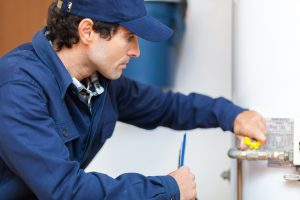Handling the Most Prevalent Heater Urgent Issues
Handling the Most Prevalent Heater Urgent Issues
Blog Article
Just about everyone seems to have their own individual ideas with regards to Is Your Water Heater Leaking?.

A water heater is just one of the most crucial fundamental devices that can be discovered in a home. With hot water heater, you do not need to go through the stress of home heating water manually each time there is a need to wash, wash, or the recipes. There is constantly an opportunity that your water heating system would act up as with many mechanical devices.
It is important to keep in mind any kind of little malfunction and tackle it rapidly before things get out of hand. A lot of times, your water heater starts to malfunction when there is an accumulation of debris as a result of constant use. As a precaution, regular flushing of your water heater is advised to avoid sediment build-up as well as avoid practical failing.
Typical hot water heater emergency situations and just how to handle them
Leaky hot water heater storage tank.
In this circumstance, you should turn off your water heating system, allow it to cool down, and carefully look for the resource of the problem. At times, all you need to do is to tighten a couple of screws or pipe connections in cases of minor leakages. If this does not function as well as the leakage persists, you might require to use the solutions of a service technician for an appropriate substitute.
Fluctuating water temperature level.
Your water heating system might start creating water of different temperature levels normally ice chilly or scalding warm. There could be a need to change either the heating or the thermostat unit of your water heating system.
Too little warm water
It might be that the water heating system can not sustain the warm water need for your apartment or condo. You might update your water heating system to one with a larger capability.
Tarnished or stinky water
When this takes place, you require to understand if the problem is from the storage tank or the water source. If there is no amusing smell when you run cool water, after that you are certain that it is your water heating unit that is faulty. The smelly water can be created by rust or the build-up of germs or debris in the water heating unit storage tank.
Final thought
Some house owners neglect little caution and minor faults in their hot water heater system. This only causes additional damage as well as a possible total malfunction of your appliance. You ought to handle your water heater faults as soon as they come up to avoid more expenses as well as unnecessary emergency difficulties.
With water heaters, you do not need to go via the anxiety of heating water by hand every time there is a demand to take a bathroom, do the washing, or the dishes. Your water heating unit might start creating water of different temperature levels usually ice cold or scalding hot. It might be that the water heating unit can not sustain the hot water need for your home. If there is no funny smell when you run cold water, after that you are specific that it is your water heater that is malfunctioning. The smelly water can be triggered by rust or the buildup of germs or sediments in the water heating system tank.
Common Water Heater Issues and What You Should Do
What Type of Water Heater Do You Have?
Before we begin it’s first important that you identify the type of water heater you have on your property. There are two main types of water heaters out there: conventional and high efficiency.
Both of these types of products typically use either gas or electricity to heat power. There are also solar water heaters that use a thermal collector on the roof or yard to heat the water.
While these models are not as common, they can cut heating costs in half. In this article, we will focus on conventional and high efficiency.
How Do My Electric and Gas Water Heater Work?
Though they look similar, electric and gas water heaters work very differently. It’s important to know their basic function because often problems can be specific to the heating source.
In the electric model, a thermostat on the side of the machine detects the temperature of the water in the tank. When the temperature needs to rise electricity flows to a heating element suspended in the water.
Gas models also use a thermostat device — typically with a mercury sensor at the tip and an additional sensor called a thermocouple. The thermocouple detects whether the pilot light is on and controls the flow of gas.
When the thermostat drops below the appropriate level gas is released which becomes ignited by the pilot light. The flame heats the bottom of the water tank which causes hot water to rise and cold water to drop.
This natural circulation continues until the water reaches the desired temperature. Then, the thermostat triggers the gas control valve to shut off the flow of gas.
What Are the Most Common Issues and How Do You Fix Them?
https://happyhiller.com/blog/common-water-heater-issues-and-what-you-should-do/

Do you really like reading up on Is Your Water Heater Leaking?? Create feedback down below. We would be interested to see your views about this piece. Hoping to see you back again soon. Those who enjoyed our article if you please do not forget to pass it around. Many thanks for your time invested reading it.
Ensure top-quality plumbing repairs. Report this page